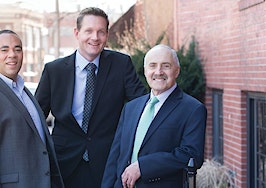- If you want development to be your niche, tour your neighborhood for tired-looking houses side by side for potential redevelopment.
- Add value to your developer clients by communicating what features your buyers especially value.
Michelle Hediger and James Marsden of the SellBoston team, could be compared to a pair of local cops doing a stake-out when they are checking out a neighborhood for development opportunities.
The top producers, who have newly arrived at Re/Max Leading Edge, go right past the tidy houses and park outside the down at-heel, under-maintained ones.

Left: James Marsden; right: Michelle Hediger
They are always sniffing out opportunities for a canny developer to replace a shabby home with four to ten high-quality new units. This is their bread and butter.
“When we look for opportunities, we walk alleyways; we make lists of the worst buildings on the block and start knocking on doors and searching for phone numbers of those buildings’ owners. The more dilapidated and unkempt a house is, the more potential it has and the more appealing it is to us. If the building looks okay or pristine, we walk right by,” said Hediger.
Working with a lot of Boston brownstone “triple deckers,” she and Marsden specialize in new build condominiums, averaging prices around the $1 million mark. Their main markets are Somerville, South Boston, Dorchester and Cambridge.
In many cases, developers will demolish the existing homes, combine two separate sites and build from the ground up — up to four residences with garage parking.
The agent duo remembers helping one homeowner with a sale, which was a struggle because it was a single family home on a small lot.
Said Marsden: “We were sitting around the offices, brainstorming between the two of us. We were trying to make the numbers work, and a light bulb went on: All we needed to do is get one of the adjoining neighbors to sell, combine the lots and we would have a very lucrative development.
“So we got up, drove down there and knocked on all of the adjoining houses — and when one neighbor said he wanted to sell, we knew it was only a matter of making the numbers work.”
Knowing your numbers: vital in the development game
The “numbers geeks,” as they describe themselves, were ready with all the relevant information on a spreadsheet when the neighbor opened the door.
“We had already crunched the numbers on what the acquisition costs would need to be, for each of the neighbors’ properties, in order for the development project fiscally make sense,” said Hediger.
“That way when the neighbor said he had thought about selling, we were able to immediately engage and discuss numbers. The neighbor’s figures fit within our pre-determined range, and all of a sudden the deal was on. We just had to find the right developer.”
Though more people are coming to them these days because of their reputation, “searching for the next diamond in the rough” is still something they love and continue to do, she said.
“There is definitely a thrill of the chase for the both of us. Thinking outside the proverbial box kinda gives us a rush in itself,” added Marsden.
“There is something about coming up with creative solutions and ways to approach things in a way nobody else does, that we enjoy.”
Their business is more long-term than some might like, but once you get a supply pipeline going, it’s worthwhile. The team has a current pipeline of $60 to $70 million in new construction. It usually takes eight or six months before a new property is ready to market.
“We have six or seven projects started; we work through these projects almost on a daily basis, then go back to developer.,” said Marsden. “The suggestion might be: ‘You need to move this wall two foot because you will need a closet in here.'”
They are very hands-on, said Hediger: “We consult with developers throughout their design and building process.
“It’s about making sure the product that we are putting on the market is not only better but aesthetically differentiated from their competition,” she added. “Developers frequently fall into patterns of using the same tile, the same kitchens, the same fixtures — we push them out of their comfort zone with recommendations that are more on-trend and that appeal to the consumer in the current market. This enables us, as listing agents, to exceed pricing expectations on the development project.”
“There are 100 buyers in a pool and every decision you make takes buyers out of the pool — you want to differentiate but paint a picture that everybody loves,” added Marsden.
The SellBoston agents work with two strong demographics of buyers — empty nesters downsizing but not wanting to sacrifice on quality, and millennials looking for an upgrade. Something which can be a challenge in this low inventory market.
Hediger and Marsden like it when their clients say, “These guys got me in when it was a hole in the ground.”
A move to Re/Max prompted by desire to build a team
The SellBoston team recently moved to Re/Max Leading Edge’s Back Bay office from the Bushari Group in April, where they said they were the No. 1 sales team for the first quarter of 2016 and in the top three for 2015.
They were looking for more from their brokerage.
They had had a number of approaches from other firms with their impressive figures of $23 million for 2015, and $30 million for January through May 27, 2016. The total year’s projections are for $65 million by the close of 2016.
Marsden and Hediger went with Re/Max Leading Edge because of the people and the support they believe they will have, they said.
Re/Max Leading Edge’s CEO, Linda O’Koniewski, and chairman, Paul Mydelski, were the particular drivers to the brokerage for them, said Hediger.
They also mention Steve Chuha and Eileen Hamblin. “We ‘leeched’ onto them,” said Hediger.
“We thought they were the best match as far as personality,” said Marsden. “We cut to the chase — we don’t filter well,” he said.
Marsden, a native New Yorker and Hediger, a former pharmaceuticals executive, who has lived in New York, like to think they bring a New York pace to their Boston market.
Marsden explains why they made their second move as a team.
At the broker-centric real estate companies, the agents work very hard to make the brokers and the company look better, he said.
“And that is good for agents who do under $5 million a year, but we will do over $60 million in 2016, and we have doubled our volume every year in the few past years with our hard work and hustle.
“We just came to the conclusion we were never going to achieve our business goals and maximize our potential where we were. We needed a platform where we could get more support, somewhere that would invest in us to grow us as a team.”
Hediger and Marsden met working as buyer agents at Charlesgate Real Estate in 2011 — they literally worked back-to-back in a cubicled office and found they were the first ones in and the last ones to leave.
“We had the same work ethic. Personality-wise, we are both challengers,” he added.
And, as they build their team, they want similar hard workers to join them.
Ideally, the first hire will be an agent who can help with the re-sales while Hediger and Marsden concentrate on the new construction and development side.
Re/Max to help with the education of their new recruits
In a lot of boutique firms that are broker-centric, team leaders are responsible for training, said Hediger.
“When you are responsible for training, this takes away time from your own work and consequently impedes production.”
With the Re/Max Leading Edge company structure, when you take on a new team member, “we are responsible for them, but Re/Max Leading Edge supplies the education, training and support, and Michelle and I can focus on running the team,” added Marsden.
A new agent coming into the team will have to be a seasoned high performer and understand the team leaders have two speeds — on or off.
“We are looking for hungry people,” said Hediger.
“The person we look for will realize it’s a long hour business, with a lot of stress, but they will have a sense of humor. They will have to enjoy the road up the hill as well as down the hill,” said Marsden.
Meanwhile, he and Hediger feel they have arrived in the right place for them at this stage.
“We understand when you run a business inside of a business, you won’t always be understood — but you want to be respected and Re/Max Leading Edge has shown us that respect since we came on board.”













